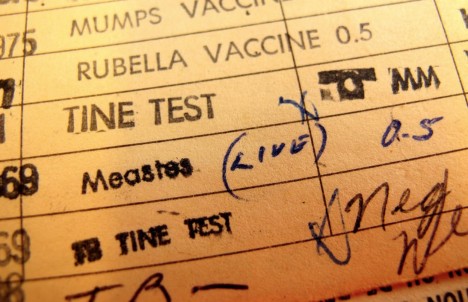
(CC BY 2.0) frankieleon/Flickr
Most of the claims made by anti-vaxxers in defending their refusal to vaccinate their children against measles and other diseases – that the vaccines cause autism, that they actually give some children measles, that they’re loaded with mercury and other toxins – have been shown again and again to be utterly groundless. But there is one argument that has been made against the measles vaccine in particular that actually seemed to have an element of intuitive reasonableness behind it. To wit: in battling the measles infection, the child’s immune system is toughened up, like going through a kind of biological boot camp, and thus becomes more able to resist and defeat other common childhood diseases.
Lowers the death rate from infections across the board
But a compelling study just published in the journal Science indicates that exactly the opposite is true, that the immune system is in fact weakened by its struggle with measles, to the extent that in the aftermath of the measles infection the immune system is actually less able to defend against such other childhood maladies as bronchitis, pneumonia, diarrhea-causing illnesses and various infections, some of them potentially fatal.
We have actually known about this post-measles vulnerability for some time, but the prevailing wisdom has been that the effect was merely temporary, lasting just a few weeks or perhaps months, and hardly life-threatening. Not so, according to the Science study, which crunched an impressive amount of clinical data from the U.S., England, Wales and Denmark, and found that not only did the weakening of the immune system last much longer than assumed, for two or more years, but that measles vaccination resulted in a statistical reduction in illness and death due to other infections.
In the U.K., for example, it turned out that the incidence of measles in a population was a virtual predictor of subsequent death rates from other infectious diseases, with the number of such deaths increasing in proportion to the size of the measles outbreak over the following 28 months. The statistics from the U.S. and Denmark were similar. In some cases, the apparent ability of the measles vaccination to help the body repel other illnesses was striking: in the U.S., the death rate from respiratory or diarrheal diseases fell by two-thirds in populations after undergoing widespread measles vaccination programs.
Mechanism not yet understood
The exact mechanism at work here is still unknown, but previous experiments with monkeys found that those who were afflicted with measles experienced a decrease in the white blood cells that their bodies had developed to fight other infections, with those cells replaced by new ones specifically created to fight measles. Based on this, the researchers theorize that a body which has to defeat measles on its own undergoes a kind of “immune amnesia” in which its immune system “forgets” how to identify and battle other dangerous infections, and that it take two to three years for this memory bank to be restored. In contrast, a body which has been vaccinated against measles never goes through this wholesale trashing of its immune system in order to fight the disease.
Whatever the biochemical process involved, the takeaway is profoundly clear: a vaccination against measles is also a vaccination against the threat of across-the-board vulnerability to numerous serious diseases for several years. This finding probably won’t change the minds of most, or even many, anti-vaxxers, but at least it should make it that much harder for them to sell their bill of goods to others.

By Robert S. Wieder, CalorieLab’s Senior Health Columnist since 2006. Author of several books, including 115 Reasons Why It’s Not Your Fault You’re Fat, Bob wrote for numerous national magazines after starting out as editor of the UC Berkeley humor magazine the California Pelican. He also put in a stint as a San Francisco-area stand-up comic.
Measles Vaccination Boosts Overall Disease Resistance is a post from:
SOURCE: – Read entire story here.




